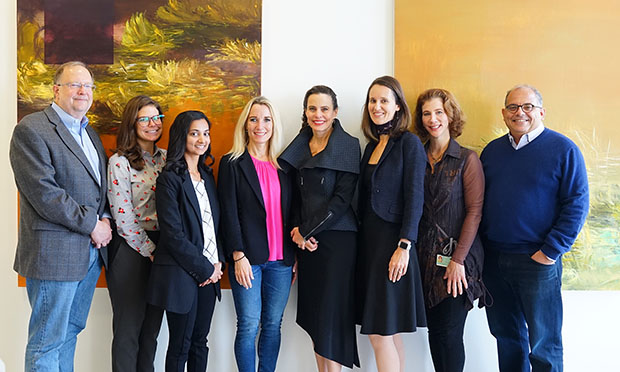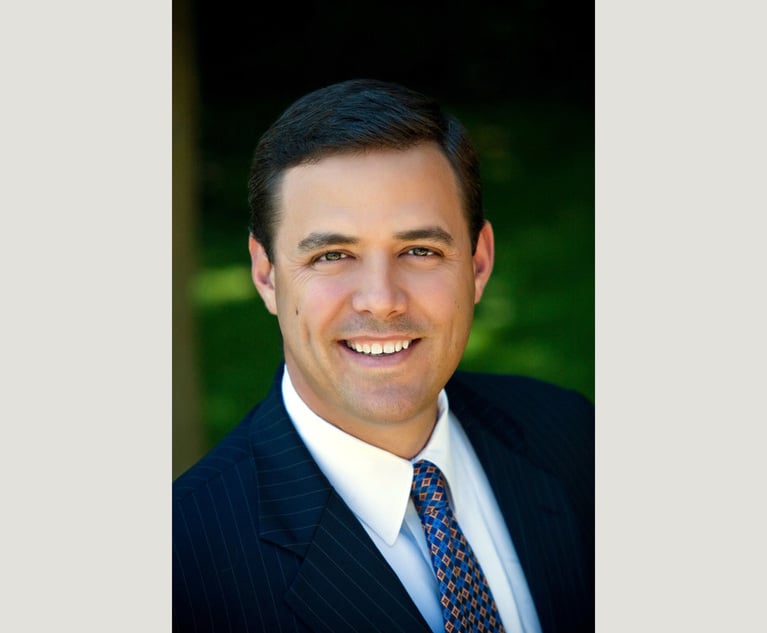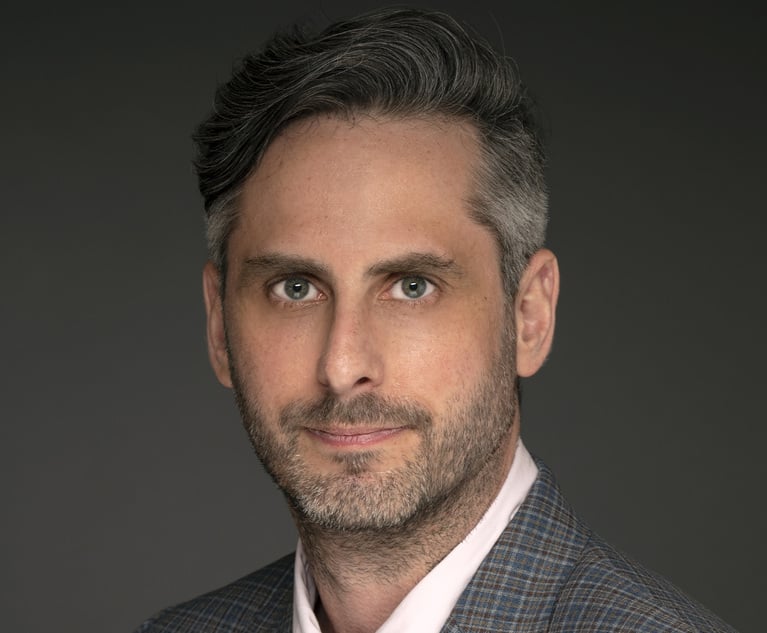Innovations in Pro Bono: Skadden
"While there are other school-based programs focusing on cyberbullying, social media use and related topics, this is one of the few—and we believe the first—that focuses on students' legal rights and responsibilities in the realm of social media use," says Skadden's Stacy Kray.
October 25, 2019 at 08:00 AM
4 minute read
 (L to R) Skadden's "Know Your Rights" team: Ken King, Kelsey Merrick, Roshni Kumar, Amy Park, Stacy Kray, Katy Cummings, Monica Schreiber and Amr Razzak. Not pictured include Patrick Hammon, Ken Kumayama and Colleen Lee.
(L to R) Skadden's "Know Your Rights" team: Ken King, Kelsey Merrick, Roshni Kumar, Amy Park, Stacy Kray, Katy Cummings, Monica Schreiber and Amr Razzak. Not pictured include Patrick Hammon, Ken Kumayama and Colleen Lee.
Skadden, Arps, Slate, Meagher & Flom's "Know Your Rights and Know the Law: Sex, Bullying and Social Media" program has been offered to thousands of students in the Bay Area to teach them their legal rights and responsibilities in the realm of social media and technology. The firm, which is being recognized for its Innovations in Pro Bono for the efforts as part of The Recorder's California Leaders in Tech Law and Innovation Awards, has partnered with Applied Materials, PayPal, Hewlett Packard and others in the effort. Skadden counsel Stacy Kray recently discussed how the program came about and the firm's plans for expanding it.
The Recorder: How did this pro bono project come about?
Stacy Kray: Following a focused inquiry into how Skadden attorneys could best make a positive impact in the Silicon Valley community, a group of attorneys and support staff created "Know Your Rights and Know the Law: Sex, Bullying and Social Media" almost six years ago in response to what has been widely called a public health crisis: teens engaging in negative, sometimes illegal, behavior while using social media. From "sexting" to the live streaming of sexual assault, headlines around the country continue to speak to the urgency of these often legally complex cases.
In the most tragic situations, young people have taken their own lives upon learning private photos have been disseminated. In fact, the tragic death of Audrie Pott, a 15-year-old Saratoga high schooler who committed suicide in 2012 after photos of her assault at a party were allegedly publicized to her classmates, was a driving impetus behind the creation of the program—the desire on the part of Skadden to make something positive come out of such a sad situation.
How much work have the firm and its partners put in on the project so far?
Since the program's inception, our attorneys have logged more than 5,000 hours of pro bono time in connection with this program. Members of our staff also devote significant time to running this project. Most notably, our in-house counsel partners, including attorneys from PayPal, Applied Materials, HP and many other Silicon Valley companies, also have together given many hundreds of hours to this program.
What's your proudest accomplishment of this pro bono representation to this point?
While there are other school-based programs focusing on cyber-bullying, social media use and related topics, this is one of the few—and we believe the first—that focuses on students' legal rights and responsibilities in the realm of social media use. This crisis has an especially compelling angle here in Silicon Valley, where local teens live in the world's epicenter of technology, but many never receive any formal training regarding laws regulating the use of that technology.
Accordingly, we are especially proud of the breadth and longevity of the program—we have reached more than 13,800 high school students with our interactive presentations. We routinely hear back from the students that they gleaned valuable information they previously were not aware of. For example, they come away with a firm grasp of important legal concepts as consent and accomplice liability. This program is not about peppering students with information about what they shouldn't do; rather, it is about empowering them to make smart decisions in their own lives and to be advocates for their peers. The feedback we get from the students—that little light we see go on in their eyes during the classroom presentation—that's what we are most proud of.
What are your goals for the project going forward?
To broaden our army of amazing teachers and find ways to make our message resonate even more loudly with teens in need.
This content has been archived. It is available through our partners, LexisNexis® and Bloomberg Law.
To view this content, please continue to their sites.
Not a Lexis Subscriber?
Subscribe Now
Not a Bloomberg Law Subscriber?
Subscribe Now
NOT FOR REPRINT
© 2025 ALM Global, LLC, All Rights Reserved. Request academic re-use from www.copyright.com. All other uses, submit a request to [email protected]. For more information visit Asset & Logo Licensing.
You Might Like
View All
How I Made Office Managing Partner: 'Stay Focused on Building Strong Relationships,' Says Joseph Yaffe of Skadden

US Patent Innovators Can Look to International Trade Commission Enforcement for Protection, IP Lawyers Say

How the Deal Got Done: Sidley Austin and NWSL Angel City Football Club/Iger

How Uncertainty in College Athletics Compensation Could Drive Lawsuits in 2025
Trending Stories
- 1Meet the New President of NY's Association of Trial Court Jurists
- 2Lawyers' Phones Are Ringing: What Should Employers Do If ICE Raids Their Business?
- 3Freshfields Hires Ex-SEC Corporate Finance Director in Silicon Valley
- 4Meet the SEC's New Interim General Counsel
- 5Will Madrid Become the Next Arbitration Hub?
Who Got The Work
J. Brugh Lower of Gibbons has entered an appearance for industrial equipment supplier Devco Corporation in a pending trademark infringement lawsuit. The suit, accusing the defendant of selling knock-off Graco products, was filed Dec. 18 in New Jersey District Court by Rivkin Radler on behalf of Graco Inc. and Graco Minnesota. The case, assigned to U.S. District Judge Zahid N. Quraishi, is 3:24-cv-11294, Graco Inc. et al v. Devco Corporation.
Who Got The Work
Rebecca Maller-Stein and Kent A. Yalowitz of Arnold & Porter Kaye Scholer have entered their appearances for Hanaco Venture Capital and its executives, Lior Prosor and David Frankel, in a pending securities lawsuit. The action, filed on Dec. 24 in New York Southern District Court by Zell, Aron & Co. on behalf of Goldeneye Advisors, accuses the defendants of negligently and fraudulently managing the plaintiff's $1 million investment. The case, assigned to U.S. District Judge Vernon S. Broderick, is 1:24-cv-09918, Goldeneye Advisors, LLC v. Hanaco Venture Capital, Ltd. et al.
Who Got The Work
Attorneys from A&O Shearman has stepped in as defense counsel for Toronto-Dominion Bank and other defendants in a pending securities class action. The suit, filed Dec. 11 in New York Southern District Court by Bleichmar Fonti & Auld, accuses the defendants of concealing the bank's 'pervasive' deficiencies in regards to its compliance with the Bank Secrecy Act and the quality of its anti-money laundering controls. The case, assigned to U.S. District Judge Arun Subramanian, is 1:24-cv-09445, Gonzalez v. The Toronto-Dominion Bank et al.
Who Got The Work
Crown Castle International, a Pennsylvania company providing shared communications infrastructure, has turned to Luke D. Wolf of Gordon Rees Scully Mansukhani to fend off a pending breach-of-contract lawsuit. The court action, filed Nov. 25 in Michigan Eastern District Court by Hooper Hathaway PC on behalf of The Town Residences LLC, accuses Crown Castle of failing to transfer approximately $30,000 in utility payments from T-Mobile in breach of a roof-top lease and assignment agreement. The case, assigned to U.S. District Judge Susan K. Declercq, is 2:24-cv-13131, The Town Residences LLC v. T-Mobile US, Inc. et al.
Who Got The Work
Wilfred P. Coronato and Daniel M. Schwartz of McCarter & English have stepped in as defense counsel to Electrolux Home Products Inc. in a pending product liability lawsuit. The court action, filed Nov. 26 in New York Eastern District Court by Poulos Lopiccolo PC and Nagel Rice LLP on behalf of David Stern, alleges that the defendant's refrigerators’ drawers and shelving repeatedly break and fall apart within months after purchase. The case, assigned to U.S. District Judge Joan M. Azrack, is 2:24-cv-08204, Stern v. Electrolux Home Products, Inc.
Featured Firms
Law Offices of Gary Martin Hays & Associates, P.C.
(470) 294-1674
Law Offices of Mark E. Salomone
(857) 444-6468
Smith & Hassler
(713) 739-1250






